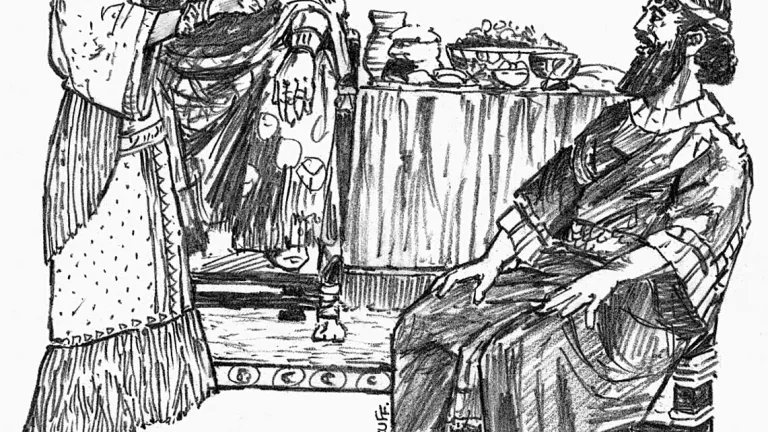Haman's plot against the Jews
Haman's Genocidal Plot
In chapter 3 we are first introduced to the villain of the story—Haman. A few years have gone by since the events of our previous reading. The date of Haman's promotion is not given but his casting of lots soon afterward to determine when to destroy the Jews occurred in the first month of the 12th year of Xerxes (verse 7)—that is, in the spring of 474 B.C.
Haman is referred to as the son of Hammedatha the Agagite (verse 1). Some link the term Agagite with a district of the empire. "An inscription of Sargon mentions Agag as a district in Persia" (Expositor's Bible Dictionary, footnote on verse 1). Many others see Agagite as meaning a descendant of King Agag of the Amalekites in the days of Saul (see 1 Samuel 15). Josephus refers to Haman as being "by birth an Amalekite" (Antiquities of the Jews, Book 11, chap. 6, sec. 5). And Jewish tradition agrees. The Amalekites, a branch of the Edomites, were ancient enemies of the Israelites (see Exodus 17:8). God had ordered Saul to wipe them out but he did not comply, sparing Agag whom the prophet Samuel then put to death. The name Agag, seeming to denote "prime ruler," could have been a title borne by all Amalekite kings. As is explained in the Beyond Today Bible Commentary on Obadiah, it is likely that the Edomites ranged widely over the ancient Middle East. It even appears that some of the Amalekites eventually settled in Central Asia, so it could well be that the Persian province of Agag was made up of Amalekites.
Haman's identity as an Amalekite would explain Mordecai's refusal as a Jew to bow to him (see Esther 3:2-4). It was not wrong to bow to human leaders (compare Genesis 23:7; Genesis 27:29; 1 Samuel 24:8; 2 Samuel 14:4; 1 Kings 1:16). Some, though, believe that what Xerxes expected with regard to people bowing to Haman was tantamount to worship. That could be, but the fact of Haman being an ancestral enemy—belonging to a people that God Himself had ordered utterly destroyed—would be reason enough. The Expositor's Bible Commentary states, "The most probable reason was, as a Targum suggests, Mordecai's pride; no self-respecting Benjaminite would bow before a descendant of the ancient Amalekite enemy of the Jews" (note on Esther 3:2-4).
Haman's reaction of hatefully desiring to exterminate the entire Jewish race (verses 5-6) also seems best explained by his Amalekite heritage. Josephus says that Haman determined to abolish the whole nation "for he was naturally an enemy to the Jews, because the nation of the Amalekites, of which he was, had been destroyed by them" (sec. 5). This would make the issue one of revenge—not just personal revenge against Mordecai but national revenge for the loss suffered so long before by Haman's own people. Indeed, the ancient animosity and envy over Israel's blessings goes all the way back to the conflict between Jacob (ancestor of the Israelites) and Esau (from whom the Edomites and Amalekites were descended). In the Middle East, as is still the case today, old antagonisms die hard.
In verse 7, "the non-Hebraic word pur (probably the Akkad[ian] word puru {'die' or 'lot'}, which is explained by the Hebrew goral {'lot'} anticipates the institution of Purim (i.e., 'lots') in chapter 9" (Expositor's, note on 3:7). The Jews had at times cast lots to determine God's will—as even the apostles would later do to replace Judas Iscariot (see Acts 1:23-26). But Haman's use of lots, besides his evil intent, was occultist and pagan. "The fact that the lot was cast at the beginning of the year to determine the best time to destroy the Jewish people fits with the culture of the day. The Babylonian religion maintained that the gods gathered at the beginning of each year to establish the destiny of human beings" (Nelson Study Bible, note on verse 7).
Verse 8 gives us Haman's accusation against the Jews, though he does not name them up front—and perhaps he never did name them. Shmuley Boteach, a Jewish rabbi, wrote the following in a recent WorldNetDaily column: "For 2,000 years, Jews have asked themselves the question an increasing number of Americans are now asking: Why do they hate us? Is it possible that the underlying causes of anti-Semitism are similar to the underlying causes of anti-Americanism? When I lived in Oxford, I heard all kinds of academic theories proffered as to the cause of anti-Semitism, but few seemed as straightforward as the reason given by the first documented, genocidal anti-Semite—the biblical Hitler—Haman. In asking King Ahasuerus for the authority to slaughter all the Jews in the ancient Persian empire, he says: 'There exists a people, dispersed and scattered among the nations, in all the provinces of your kingdom. And yet their values are entirely different from everyone else's.' Jewish singularity, Jewish peculiarity, a refusal to blend in and be like everybody else is what foments hatred in Haman's breast. Why do you Jews hold yourselves aloof? Why don't you just become like everybody else? Do you think you're better than us? Add to this the Jewish penchant for promoting social justice and a steadfast commitment to espousing morality and you have the perfect formula for hating the foreigner who not only rejects your way of life while living in your country, but makes you feel inferior, to boot. The Talmud says that Mount Sinai (literally, 'mountain of hatred') was given its name because after the Jews [i.e., Israelites] received the Torah and committed themselves to lives of ethical virtue, the enmity of the world's inhabitants—who now stood out as immoral—descended heatedly upon them" (March 12, 2004).
Of course, virulent hatred and persecution has been directed toward true Christians for very similar reasons. Jesus said: "If the world hates you, you know that it hated Me before it hated you. If you were of the world, the world would love its own. Yet because you are not of the world, but I chose you out of the world, therefore the world hates you" (John 15:18-19). Jesus referred to Himself and His followers as the light of the world (John 8:12; John 9:5; Matthew 5:14). And in John 3:19-20 He explained: "This is the condemnation, that the light has come into the world, and men loved darkness rather than light, because their deeds were evil. For everyone practicing evil hates the light and does not come to the light, lest his deeds should be exposed." God's people are indeed peculiar and different—and their message and way of life exposes the shortcomings and outright wickedness of the society around them.
On verse 9 of Esther 3, Expositor's comments: "In order to obtain the king's permission to destroy the Jews, Haman appealed to the monarch's greed, offering to put ten thousand talents of silver of his own private fortune into the royal treasury to pay the men who would carry out the pogrom.... It is impossible to determine the value of the silver in current monetary equivalents. It was a fabulous sum that is estimated to weigh approximately 375 tons. It has also been estimated to represent the equivalent of two-thirds of the annual income of the Persian Empire.... Perhaps Haman planned to acquire such a large sum by confiscating the Jews' property."
Verse 11 might seem to say that the king was giving the money to Haman—or at the very least refusing to take Haman's money. Yet Esther 4:7 makes it clear that Haman promised to pay the money into the king's treasury and Esther later described her people as being "sold" (Esther 7:4). It could be, as many suggest, that the king was pretending to refuse the money in the common method of Middle East bargaining (as in Genesis 23:7-18). However, scholar Carey Moore in the Anchor Bible translates the king's response to Haman as "'Well, it's your money,' i.e., 'If you want to spend it that way, it's all right with me'" (Expositor's, footnote on Esther 3:11).
The giving of the king's signet ring to Haman in verse 10 seems to have effectively made him a prime minister or chief of staff. That it constituted more than a mere formality needed for issuing the immediate proclamation is evident from the fact that Haman bore the ring until his death (see Esther 8:2). Indeed, Haman at one point remarks about his position that the king "advanced him above the officials and servants of the king" (Esther 5:11).
The destruction of the Jews was to be accomplished in March of 473 B.C. (compare Esther 3:13). "Critics say Haman would not have promulgated a vindictive decree for the extermination of the Jews and then waited eleven months to carry it out, as it would have given them time to escape or to prepare for defense. [One commentator] says Haman resorted to casting the lot to determine a propitious day for carrying out his slaughter and had such confidence in the power of magical decisions that premature publication would not change the Jews' fate. [Another] says that the Jews' flight would not have been unwelcome to Haman as he would still accomplish his purpose of confiscating their property" (Expositor's, introductory notes on Esther).
As the decree of mass genocide is sent out, the king and Haman contemptibly "sat down to drink" (verse 15)—perhaps toasting the action—heartless to the horrendous nature of the coming atrocity. Yet in the king's case, he may have been somewhat misled as to the wording of the decree, having placed complete trust in Haman. He may not even have realized that the Jews were the ones condemned or, if he did, that all of them were to be destroyed—especially given his later honoring of Mordecai. We do see in verse 15 that at least the people at the capital of Susa or Shushan did not relish what was happening. They were utterly bewildered at this order. It was certainly not typical of Persian rule, which was normally characterized by cultural pluralism and mild treatment of conquered peoples. Indeed, we may be sure that there were evil spiritual forces working behind the scene in an attempt to eradicate the Jewish people through whom the redemption of all mankind would eventually come. But God's great plan will not be thwarted.




Beyond Today Bible Commentary: Esther